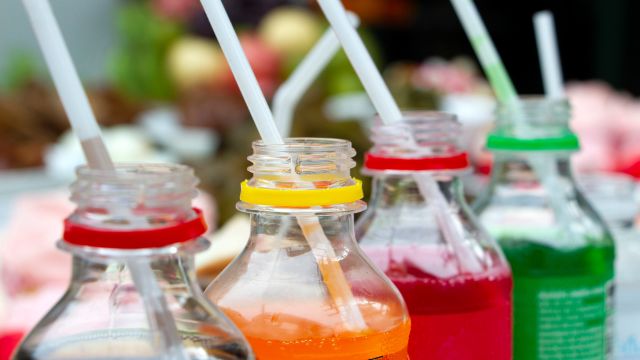Updated on July 14, 2022.
If you frequently reach for a soda or sugary sweet tea to quench your thirst, it could be time to break the habit.
Consuming drinks with added sugars has been associated with obesity, hypertension, and type 2 diabetes. Research also suggests that drinking too many sugary beverages—such as carbonated and noncarbonated sodas, sugar-sweetened fruit drinks and punches, energy drinks, and sports drinks—is associated with a greater risk of early death. This could be bad news if you’re one of the 49 percent of adults who consume a sugar-sweetened beverage on any given day, according to the Centers for Disease Control and Prevention (CDC).
How many pre-sweetened drinks are too much?
A study published in 2019 in the journal Circulation found that increased intake of sugar-sweetened beverages was linked to early mortality, primarily through cardiovascular disease and cancer.
Researchers looked at the drink consumption of almost 38,000 men from the Health Professional’s Follow-Up Study (from 1986 to 2014) and more than 80,000 women from the Nurse’s Health Study (covering 1980 to 2014). They found that people who consumed two or more servings per day of sugar-sweetened drinks had a 31 percent increased risk of death from cardiovascular disease (CVD) compared to those who drank these beverages less than once per month. Each serving per day of a sugar-sweetened beverage was associated with a 10 percent higher risk of early CVD death.
The association with cancer was more modest, with a 16 percent greater risk of early mortality for those who drank more than two servings per day, compared with people who drank fewer than one per month. Among women, there was a link between sugar-sweetened beverage intake and breast cancer. Among both genders, there was an association with colon cancer.
Regarding colon cancer, a 2021 study in the journal Cancer found sugary drinks were a risk factor for early onset of the disease, behind alcohol use and obesity. (Early-onset colon cancer occurs in people younger than age 50.) Consuming seven or more sugary drinks per week was associated with an increased risk.
Neither study could determine that sugary drinks were a direct cause of death, but they strengthen the association between risk of disease, early mortality, and pre-sweetened beverages.
Sweet snacks can be risky too. Sugar-sweetened foods have been linked to obesity, high blood pressure, and high cholesterol.
What you can drink instead
Cutting back on sugary drinks is a small change that can lead to big health benefits. You can replace soda, sugar-sweetened fruit juice, or energy drinks with a variety of good-for-you choices.
Water: Whether it’s still or bubbly, water is one of the best drinks for your health. Add fresh fruit to give it more flavor. If you crave the carbonation of soda, try switching to seltzer. In addition to the hydrating benefits, water may help you feel more full when consumed with meals.
Coconut water: Low in calories and high in minerals like potassium, coconut water is a great choice to replace sugar-laden drinks. Read the label to be sure it is 100 percent coconut water and free of added sugar.
Coffee: Moderate consumption is safe—even probably beneficial—for most people, but some may have conditions (like anxiety) that require them to avoid coffee. It's up to you to adjust the way you drink it. Start by cutting back on added sugars, syrups, and sweetened creamers.
Tea: Similar to coffee, drink your tea with no added sugars. If you love iced tea, make your own unsweetened version. Better yet, switch to hot black or green tea. There is some evidence that both drinks can reduce the risk of heart disease.
Low-fat milk: The American Heart Association (AHA) recommends consuming low-fat dairy products as part of a heart-healthy diet. Swap your soda or juice for 1 cup of skim or 1 percent milk. Limit or stay away from whole milk and keep your total daily intake at about 3 cups per day.
Smoothies: There are countless ways to make a healthy smoothie. Toss your choice of fresh fruits and veggies into the blender and add water or low-fat dairy—milk, non-fat Greek yogurt, or a dairy alternative. But stick to one per day, as a meal or snack, or else the calories can start adding up.
When it comes to reducing your pre-sweetened beverages, start small. Mix your favorite juice with seltzer to cut back on calories. Or begin swapping out one sugary drink per day with any of the options above.
What about artificially-sweetened beverages?
It may seem like swapping sugar-filled drinks for artificially sweetened ones would be a no-brainer. These drinks do often contain low to no calories, regardless of the type of artificial sweetener used. But they also offer no nutritional benefits—and some research points to health risks.
For example, the March 2019 study in Circulation found a greater increase in early death from cardiovascular disease in women who drank four or more artificially sweetened beverages per day. The same risk was not found in men, nor did the research link artificially sweetened drinks to cancer mortality for either gender.
In February 2019, another study reported a 23 percent higher risk of stroke among women who consumed two or more artificially sweetened drinks per day than those drinking less than 12 ounces per week. Those findings, published in Stroke, looked at data from almost 82,000 participants in the Women’s Health Initiative Observational Study.
These studies note that research on artificial sweeteners is still very preliminary and more information is needed. If you often reach for one or more sugar-sweetened drinks per day, it may still be beneficial to replace them with an artificially sweetened version. But the best change you can make is swapping soda, fruit juice, or sports drinks for more water.
When making any major dietary changes, keep your healthcare provider (HCP) in the loop. During your next physical, tell your HCP if you drink a lot of soda or other sugar-sweetened beverages so they can monitor your heart health.







